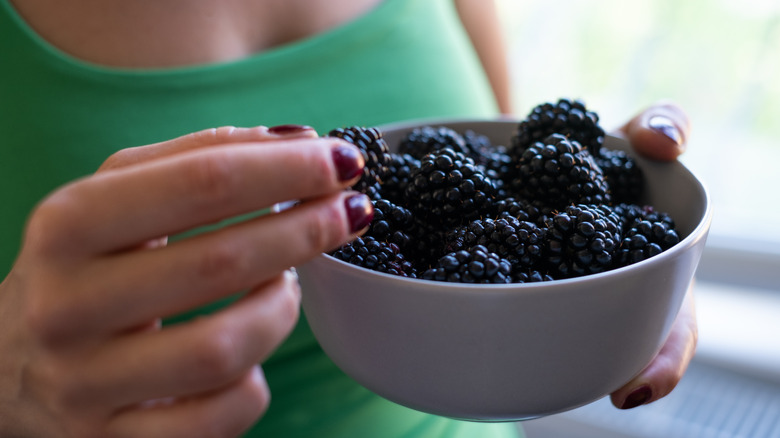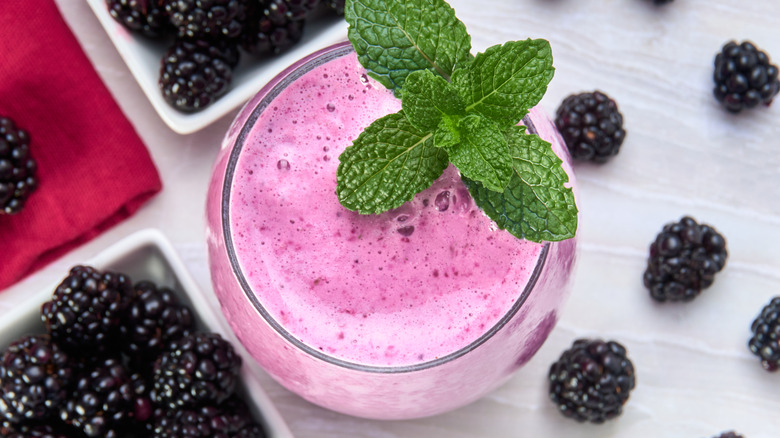This Common Berry Has An Unexpected Amount Of Protein
Protein plays a crucial role in daily nutrition. This macronutrient is essential to many functions within your body, ranging from the repair of tissues to the support of muscle growth and overall wellness. The exact amount of protein necessary varies among individuals and depends on factors like age, gender, and physical activity levels. However, as a general guideline, the Centers for Disease Control and Prevention (CDC) recommends that adult women consume 46 grams of protein while men should consume 56 grams.
While most people think of meat, dairy, or plant-based options as protein sources, did you know that blackberries can be a beneficial source of protein? They have two grams of protein per cup, according to the University of Rochester Medical Center. When you pair them with other protein-rich foods like yogurt or cottage cheese, that can really add up. Plus, these sweet and tangy little gems offer loads of other health benefits, which could make them a valuable and delicious addition to your diet.
Other nutritional benefits of blackberries
Along with protein, blackberries are packed with other nutrients. According to the Cleveland Clinic, they are an excellent source of antioxidants, which can help protect your body against oxidative stress and reduce the risk of chronic diseases. Plus, a cup of blackberries contains about 7.6 grams of dietary fiber, which can improve your digestive health and prevent gastrointestinal problems. Blackberries are also rich in essential vitamins and minerals.
They contain a healthy dose of vitamin C, which is great for your immune system and skin health. Additionally, they have vitamin K, which is necessary for blood clotting, and manganese, a mineral that is vital for bone health and metabolism (per Healthline). Blackberries are also a smart choice for those watching their calorie and carbohydrate intake as they are relatively low in calories, and their carbohydrates are mostly from fiber, which has minimal impact on blood sugar levels.
The fiber and antioxidants in these tasty berries can also reduce the risk of heart disease. Fiber helps to keep your cholesterol levels in check (per Mayo Clinic), while antioxidants protect your arteries from damage and inflammation, according to the American Heart Association. A 2012 study published in the Journal of Agricultural and Food Chemistry showed that the antioxidants in berries can help improve cognitive function and memory.
Incorporating blackberries into your diet
If you're looking to add some deliciousness to your morning routine, blackberries might be the perfect addition to your smoothie or smoothie bowl. They blend perfectly with yogurt, milk (dairy or plant-based), a banana, and a touch of honey to provide a protein-packed and antioxidant-rich start to your day. Or incorporate some blackberries into your morning bowl of oatmeal. The sweetness of the berries complements the heartiness of the oats, and the fiber and protein combination will keep you full throughout the morning.
Blackberries can also add a burst of flavor to salads. Toss them into a green salad along with some nuts and a light vinaigrette for an enticing contrast of textures and flavors. And don't forget about baking! Mix blackberries into muffins, scones, and even homemade protein bars. Perhaps the best way to enjoy blackberries is by simply eating them fresh. Keep a container of washed berries in your fridge for a quick, nutritious midday snack or a sweet treat after lunch or dinner.
It's important to keep in mind that they do contain natural sugars and calories. If you're watching your calorie intake, be mindful of portion sizes.
To keep them fresh, store blackberries in the fridge and consume them within a few days of purchase; or freeze them for long-term storage.



